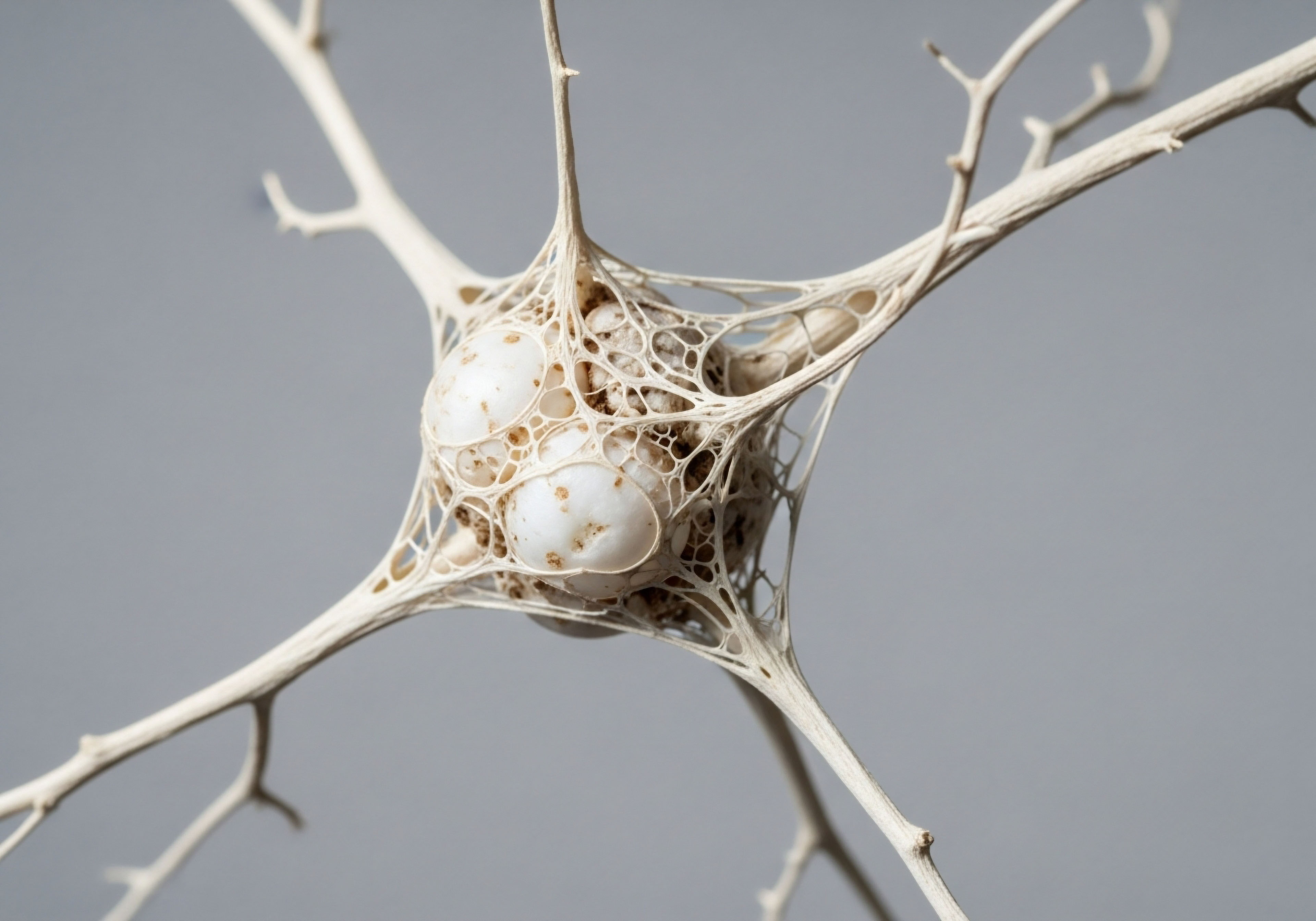

Fundamentals
The experience of cognitive change while undergoing treatment with anastrozole is a tangible and valid concern. It is a journey that begins not with a clinical definition, but with the lived reality of a mind that feels altered.
You may notice a subtle fogginess, a frustrating search for a word that was once readily available, or a lapse in concentration that feels unfamiliar. This is a direct consequence of the medication’s intended biological action. Anastrozole works by significantly reducing the amount of estrogen circulating in the body. This process, while a cornerstone of certain therapeutic protocols, has profound effects that extend to the brain.
Estrogen is a powerful modulator of cognitive function. It acts as a master regulator within the central nervous system, influencing everything from the birth of new neurons to the speed of communication between them. When estrogen levels are pharmacologically suppressed, the brain’s intricate signaling environment is altered.
This is not a failure of your intellect; it is a physiological recalibration. The cognitive symptoms you may be experiencing are the external manifestation of this internal shift. Understanding this connection is the first step toward reclaiming a sense of control and cognitive clarity.
The cognitive side effects of anastrozole are a direct result of its mechanism of action, which involves the systemic suppression of estrogen, a key neuroprotective hormone.
The primary areas of cognition affected by estrogen deprivation are often verbal memory, learning, and executive function. This is because the brain regions responsible for these tasks, such as the hippocampus and prefrontal cortex, are particularly rich in estrogen receptors. When these receptors are no longer activated by estrogen, the efficiency of these cognitive processes can decline.
This can manifest as difficulty remembering conversations, struggling to learn new information, or finding it harder to plan and organize your day. It is a biological reality, not a personal failing.
The journey through this experience is a personal one, but the underlying biology is universal. By understanding the direct link between anastrozole, estrogen suppression, and cognitive function, you can begin to explore targeted lifestyle interventions designed to support brain health and mitigate these effects.
This is not about fighting against your treatment, but about working with your body to create a new state of equilibrium. It is about providing your brain with the resources it needs to adapt and function optimally within its new hormonal environment.


Intermediate
Addressing the cognitive side effects of anastrozole requires a multi-faceted approach that goes beyond simply acknowledging the problem. It involves the implementation of specific, evidence-based lifestyle interventions designed to bolster cognitive resilience. These strategies work by targeting the very biological pathways that are disrupted by estrogen deprivation. They are not passive recommendations, but active, targeted protocols that can help to preserve and even enhance cognitive function.

Can Specific Exercises Counteract Anastrozole’s Cognitive Impact?
Physical exercise is a powerful tool for mitigating the cognitive effects of anastrozole. It works through several interconnected mechanisms that directly support brain health. Regular physical activity has been shown to increase levels of brain-derived neurotrophic factor (BDNF), a protein that is essential for the growth, survival, and differentiation of neurons. BDNF plays a critical role in learning and memory, and its production is known to be stimulated by exercise.
The type and intensity of exercise are important considerations. A combination of aerobic exercise and resistance training appears to be most effective. Aerobic exercise, such as brisk walking, running, or cycling, increases blood flow to the brain, delivering essential oxygen and nutrients.
Resistance training, such as lifting weights, helps to improve insulin sensitivity and reduce inflammation, both of which are beneficial for cognitive function. The goal is to create a consistent routine that challenges your body and, in turn, stimulates your brain.
A targeted exercise regimen can directly counteract some of the neurological consequences of estrogen deprivation by boosting neurotrophic factors and reducing inflammation.

Nutritional Strategies for Cognitive Support
Your diet provides the fundamental building blocks for brain health. During treatment with anastrozole, it is particularly important to focus on foods that support cognitive function and reduce inflammation. A diet rich in omega-3 fatty acids, found in fatty fish like salmon, as well as in walnuts and flaxseeds, can help to support the structural integrity of brain cells. These healthy fats are a key component of neuronal membranes and are essential for efficient cell-to-cell communication.
Antioxidant-rich foods, such as berries, dark leafy greens, and other colorful fruits and vegetables, can help to protect the brain from oxidative stress. This is particularly important because the hormonal changes induced by anastrozole can increase inflammation and oxidative damage. By providing your body with a steady supply of these protective compounds, you can help to shield your brain from these harmful effects.
The following table outlines key nutritional components and their roles in cognitive health:
| Nutrient | Primary Sources | Cognitive Benefit |
|---|---|---|
| Omega-3 Fatty Acids | Salmon, mackerel, walnuts, flaxseeds | Supports neuronal membrane structure and reduces inflammation. |
| Flavonoids | Berries, dark chocolate, tea | Acts as a powerful antioxidant and improves cerebral blood flow. |
| B Vitamins (B6, B9, B12) | Leafy greens, legumes, eggs, poultry | Lowers homocysteine levels, an amino acid linked to cognitive decline. |
| Choline | Eggs, soy, shiitake mushrooms | A precursor to acetylcholine, a neurotransmitter vital for memory. |

The Role of Cognitive Engagement
Just as physical exercise strengthens the body, cognitive exercise strengthens the mind. Engaging in mentally stimulating activities can help to build cognitive reserve, which is the brain’s ability to withstand neurological damage. This can be particularly beneficial when facing the challenges of estrogen deprivation. Activities that are novel and complex are most effective at building new neural pathways.
- Learning a new skill ∞ This could be anything from a musical instrument to a new language. The process of acquiring new knowledge and skills creates new connections in the brain.
- Engaging in strategic games ∞ Chess, bridge, and other complex games require planning, memory, and strategic thinking, all of which challenge the executive functions of the brain.
- Practicing mindfulness and meditation ∞ These practices have been shown to improve attention, concentration, and working memory. They can also help to reduce stress, which can exacerbate cognitive symptoms.
By actively engaging in these lifestyle interventions, you are not just passively hoping for the best. You are taking a proactive role in your own cognitive health, providing your brain with the tools it needs to thrive in the face of hormonal change.


Academic
The cognitive sequelae of anastrozole therapy can be understood through a deep exploration of the neurobiological role of estrogen and the systemic impact of its depletion. Aromatase inhibitors, such as anastrozole, induce a state of profound estrogen deficiency, which has significant implications for neuronal function, synaptic plasticity, and cerebral metabolism. The cognitive symptoms reported by patients are the clinical manifestation of these complex cellular and molecular events.

Estrogen Deprivation and Neurotransmitter Systems
Estrogen is a key modulator of several critical neurotransmitter systems, including the cholinergic, dopaminergic, and serotonergic pathways. The cholinergic system, in particular, is heavily implicated in learning and memory. Estrogen has been shown to upregulate the activity of choline acetyltransferase, the enzyme responsible for synthesizing acetylcholine. Consequently, the drastic reduction in estrogen levels following anastrozole administration can lead to a relative cholinergic deficit, impairing memory consolidation and retrieval processes.
Similarly, estrogen influences dopamine signaling in the prefrontal cortex, a brain region that is central to executive functions such as planning, working memory, and cognitive flexibility. By modulating dopamine receptor density and sensitivity, estrogen helps to maintain optimal executive control. The absence of this modulatory influence can contribute to the difficulties in concentration and multitasking that are often reported by patients on anastrozole.

What Is the Impact on Brain Metabolism and Inflammation?
Estrogen plays a crucial role in maintaining cerebral glucose metabolism. It enhances glucose transport into neurons and promotes its efficient utilization. The hypoestrogenic state induced by anastrozole can lead to a state of relative cerebral glucose hypometabolism, particularly in estrogen-receptor-rich regions like the hippocampus and prefrontal cortex. This reduction in metabolic activity can impair neuronal function and contribute to cognitive decline.
Furthermore, estrogen has potent anti-inflammatory properties within the central nervous system. It suppresses the activation of microglia, the brain’s resident immune cells, and reduces the production of pro-inflammatory cytokines. The withdrawal of estrogen can lead to a state of heightened neuroinflammation, which has been strongly linked to cognitive impairment and neurodegenerative processes. This pro-inflammatory state can exacerbate the other neurobiological challenges posed by estrogen deprivation.
The following table details the specific neurobiological impacts of estrogen deprivation:
| Biological System | Role of Estrogen | Consequence of Deprivation |
|---|---|---|
| Cholinergic System | Upregulates acetylcholine synthesis | Impaired memory formation and retrieval |
| Dopaminergic System | Modulates dopamine signaling in the prefrontal cortex | Deficits in executive function and working memory |
| Cerebral Metabolism | Enhances glucose transport and utilization | Reduced neuronal energy production and function |
| Neuroinflammation | Suppresses microglial activation and cytokine production | Increased inflammation and oxidative stress |

How Do Lifestyle Interventions Exert Their Effects?
The lifestyle interventions discussed previously are not merely palliative; they have direct, measurable effects on the neurobiological systems affected by anastrozole. Physical exercise, for example, has been shown to increase hippocampal neurogenesis and synaptic plasticity, partly through the upregulation of BDNF. This can help to counteract the negative effects of estrogen deprivation on these processes.
A diet rich in polyphenols and omega-3 fatty acids can directly combat neuroinflammation and oxidative stress. These compounds have been shown to modulate the same inflammatory pathways that are dysregulated by estrogen deficiency. Similarly, cognitive training can enhance neural efficiency and promote the development of compensatory neural circuits, allowing the brain to maintain a high level of function despite the altered hormonal milieu.
- Physical Exercise ∞ Directly stimulates the production of BDNF, which promotes neuronal growth and survival, and has been shown to increase hippocampal volume.
- Anti-inflammatory Diet ∞ Provides the brain with the specific micronutrients needed to quell the low-grade neuroinflammation that is exacerbated by estrogen deprivation.
- Cognitive Training ∞ Induces experience-dependent neuroplasticity, strengthening the neural circuits that are most vulnerable to the effects of hypoestrogenism.
By understanding the precise mechanisms through which anastrozole affects the brain, and how targeted lifestyle interventions can counteract these effects, it is possible to develop a sophisticated, personalized strategy for maintaining cognitive health throughout treatment.

References
- Bender, Catherine M. et al. “Patterns of change in cognitive function with anastrozole therapy.” Cancer, vol. 121, no. 15, 2015, pp. 2627-36.
- Bender, Catherine M. “Long Term Trajectory of Cognitive Function Related to Anastrozole Use in Women.” Grantome, 2012.
- Collins, Brandy, et al. “Memory impairments with adjuvant anastrozole versus tamoxifen in women with early-stage breast cancer.” Journal of Clinical Oncology, vol. 26, no. 23, 2008, pp. 3858-60.
- Lange, Mirjam, et al. “Cognitive function among women with breast cancer receiving endocrine therapy ∞ what are the impacts?.” Journal of the National Cancer Institute, vol. 115, no. 5, 2023, pp. 493-503.
- Lu, B. “Can exercise ameliorate aromatase inhibitor-induced cognitive decline in breast cancer patients?.” Journal of Sport and Health Science, vol. 5, no. 1, 2016, pp. 10-16.
- Tadayon, Yasaman, et al. “Cognitive Effects of Aromatase and Possible Role in Memory Disorders.” Frontiers in Endocrinology, vol. 12, 2021, p. 700409.

Reflection
The information presented here provides a framework for understanding the intricate relationship between your body’s hormonal landscape and your cognitive world. It is a starting point for a conversation with yourself, a new lens through which to view your own experience. The path forward is one of active participation, of making conscious choices that support your brain’s resilience.
Your personal health journey is unique, and the knowledge you have gained is a powerful tool for navigating it with intention and a renewed sense of agency.

Glossary

anastrozole

cognitive function

estrogen deprivation

executive function

lifestyle interventions

providing your brain with

cognitive side effects

brain-derived neurotrophic factor

cognitive effects

omega-3 fatty acids

cognitive reserve

physical exercise

aromatase inhibitors

cholinergic system

prefrontal cortex

neuroinflammation

hippocampal neurogenesis

fatty acids




